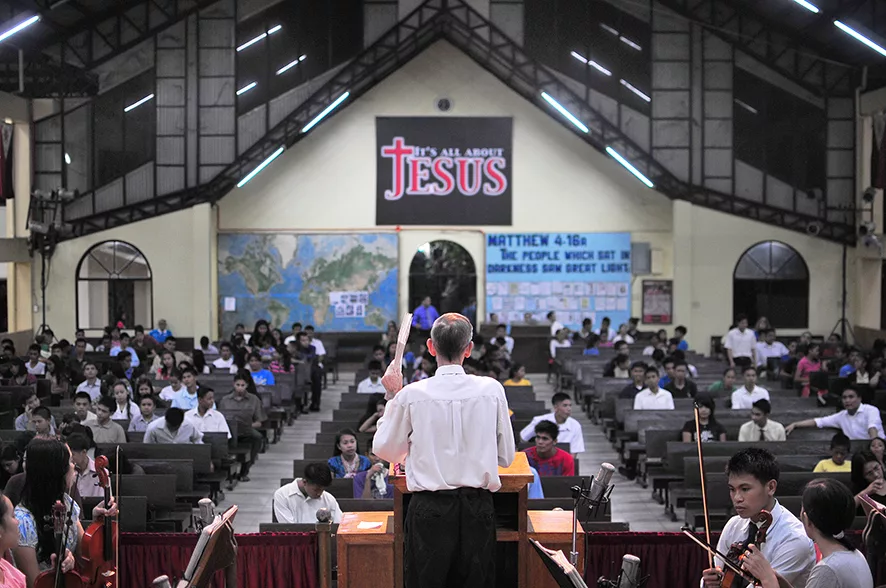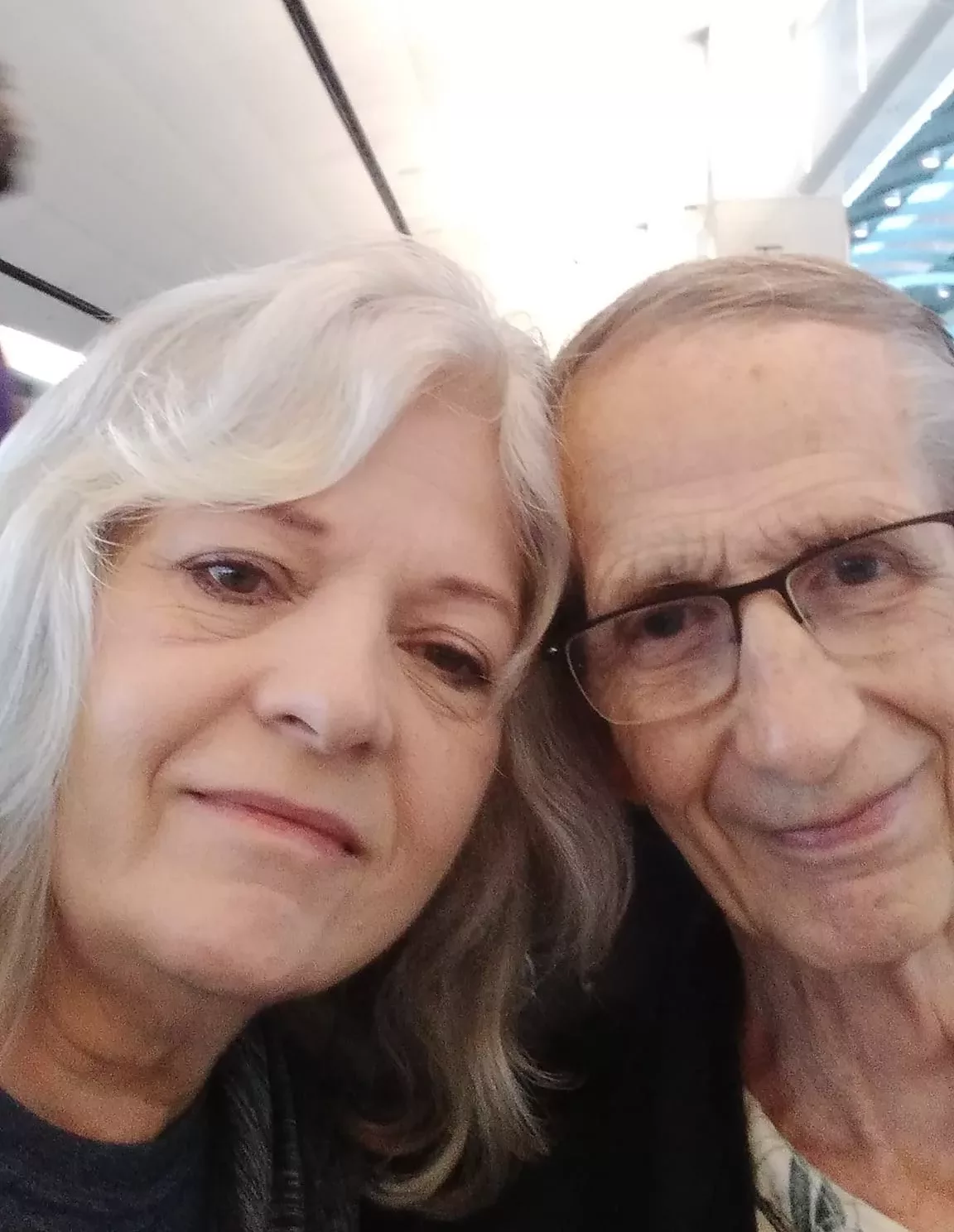
How to multiply a mission field

It seems straightforward. Start Bible colleges, “train others to train others also,” as Paul advised Timothy. Go to an open mission field, and see success.
But looking back over nearly half a century, the graduates of the Bible college of Iloilo Bapist Church in the Philippines have planted more than 800 churches, and set up 31 colleges of their own. If you include small village congregations, the total is more than 2,000 churches. And it did not happen by accident.
Iloilo Baptist Church, started in 1977, has also sent missionaries across Africa, Asia, and the Caribbean. The ministry of one couple has produced 100 churches, another family 70, another 30 … too many to count.
How did the Lord do it?
1) The call and power of the Holy Spirit,
2) A strong belief that God can do anything, and
3) A determination never to quit.
Success for me and my wife Becky was anything but a foregone conclusion in a fiercely Catholic nation that persecuted foreign missionaries. When we landed in Manila, in 1977, we were following in the footsteps of Bob and Helen Hughes, who had started a ministry 20 years earlier on the island of Cebu, and directly challenged Catholic dogma with a radio program called, “What the Bible says.”
While growth for Hughes was slow at first, God flung the door wide open when the Marcos government imposed martial law to combat communist insurrections in 1972. For eight years Hughes didn’t have 100 people in Sunday school, but the imposition of martial law, meant to deliver civic stability, also brought biblical revival.
Catholic clergy had allied themselves with the terrorists whose stated goal was to give greater power to the poor. So overnight, the church became a target of anti-communist laws, and a military crackdown. Its grip on the lives of people whose main concern was peace, was suddenly loosened.
American support and influence was coincidentally being introduced to the Philippines— through the military, and through teachers in its educational institutions—and with it, a new kind of Christianity: the truth.
The wife of one Filipino pastor who was saved out of Catholicism and started an Independent Baptist church during this period recalled, “We hadn’t even read the Bible, and suddenly we were hearing it taught, and preached. People started to get saved in big numbers.”
Like Hughes, who started his church near a university community in Cebu City, missionary Martin identified a college hub in Iloilo City, on the island of Panay in the central Philippines, and began the 2 Timothy 2:2 multiplication method:
And the things that thou hast heard of me among many witnesses, the same commit thou to faithful men, who shall be able to teach others also.
(2 Timothy 2:2)
His work would start with Bible education. From the very beginning, he visualized the ending.
“A missionary’s goal should not be to start and establish one good church on the field. It is important to do that, but it is only the start,” he says. “First, he needs to raise his support, and second, to learn the language, and third, to start a church. All of these are important. But what are your plans after that?”
Martin knew that long-term planning for any missionary is important to avoid the curse of initial busy-ness. Without keeping a long-term goal in mind, a missionary is in danger of becoming side-tracked, and thrown off course.
To guide his work, he used a manual put together while studying in Bible college. It was titled, A Strategy to Start Churches on the Mission Field., In it, he wrote: “Our goal as missionaries is to start independent, fundamental, soulwinning, New Testament Baptist churches. Paul’s goal was to start a church everywhere he possibly could. Naturally, a newer missionary is going to be focused on getting started and not thinking about what is going to happen 15 to 20 years down the road. But it would be wise to ask how long you plan to stay. If you believe it’s God’s will for your life, you should consider you’ll be on that field for 20, 30 or 40 years.”
[The manual has been added to over our years on the field, and now runs to more than 500 pages, including photographs.]
In an interview with harvest magazine, he says: “While he started with a method, and a strategy document, I must emphasize that it’s not the method, but God’s grace that is the most important thing. When we persist, by faith, he reveals his power, and so we are able to give him the glory.”
He adds: “It’s hard to explain. The guys we sent out have been faithful. And it’s not necessarily the things we’re doing day by day. In fact, it often seems that we see more failures than successes. It’s spending time with the ones you sense will go on for God. Pray for someone you can give your life to, and stick with them.”
He gives these examples:
Martin comments: “We have to remember that Jesus did not find the men who had the best academic background. He was looking for men he could train to become like him—not those who would impress others by their appearance, intellect, or status in life, but men who were teachable and would be willing to follow him.
“They did not always learn every lesson right away, but in the end they got it right. They sinned, and even let him down when he needed them most. But they wanted to follow Jesus and learn from him.”
Now when they saw the boldness of Peter and John, and perceived that they were unlearned and ignorant men, they marvelled; and they took knowledge of them, that they had been with Jesus. (Acts 4:13)
The call and power of the Holy Spirit
God’s leading for someone to surrender to the mission field may not sound like a clarion call, but it will be clear, definite, and unshakeable. And it will endure.
Martin recalls: “Being a missionary had never crossed my mind. Not that I was against it, nor because I wasn’t willing. I admired people who were missionaries. I just never saw myself being one.
“I saw myself as a preacher, and had had just interviewed for a role as an associate pastor at First Baptist Church of Hammond, Indiana. That objective changed in one night. In fewer than 10 minutes.
“Bob Hughes had returned from the Philippines for cancer surgery in Texas, and had flown up to Chicago to address a conference at First Baptist in March, 1976.
[Before the diagnosis in 1975, Hughes had visited the United States to raise awareness of the need for more missionaries to the Philippines, to preach on faith-promise missions giving, and to promote his dream of a million Bibles to be given out throughout the country.]
“I’d heard about him a little bit. People talked about him. He was dying. We were all supposed to be praying for him. He spoke for just a few minutes. Until those moments I couldn’t see the mission field. I wasn’t expecting it would have an impact on me at all. But God’s power was on that man.
“I just couldn’t see … but suddenly a picture of missions was visualized by him. He opened my eyes to the people of the world, that country specifically. I was taken by the picture he painted of the Filipino people and how open they were.
“It happened so quickly, and it happened just like that. Looking back, I know it was the Holy Spirit, and I never doubted that. I didn’t exactly know what a missionary call was. But that’s what happened. Bob Hughes talked about people being open to the gospel, and he spoke about hell, and why wouldn’t someone go and reach these people? “He’d given his life for so many years, and now this cancer came up, and it was not that someone could replace him, but you know, someone needed to go.
“And in a moment, that someone was me.”
Bob Hughes died a year later, in August, 1976 at the age of 44, and soon afterward, his dream of a million Bible was realized as the funds were raised and the Bibles distributed. The Bibles would see people saved, and if not, would ensure they were without excuse. He would say, “If people are going to go to hell, let them go with a Bible in their hand.”
How can missionaries unlock the power of the Holy Spirit? Martin says it starts by understanding that that we as instruments of God are nothing without him, but God is everything.
“I love classical music and my favorite instrument is the violin. I once held a $4 million Stradivarius made in the 1700s. But even such an instrument in the hands of a novice will not make a great sound at all,” Martin says. “Conversely, in the hands of a master violinist, even a cheap $60 violin will produce wonderful music. If we’re humble instruments, God can work wonders with us.”
He likens surrender to children obeying their parents—”It’s submitting completely to the Holy Spirit that makes the difference. We must empty ourselves and allow him to have control. How do we do it? We pray and fast. Jesus prayed and fasted and in Luke 4:14, ‘returned in the power of the Spirit into Galilee’ and in Acts 1:14, the disciples prayed together ‘with one accord in prayer and supplication’ and were given the power promised by Jesus.
God can do anything
If missionaries believe God can do anything, they can change the narrative about any mission field.
Martin’s strategy was to go to a city where he believed he would find people who would listen, rather than to a place where people don’t listen.
“Why let a harvest field rot when people are ready?” he asks. “But I also believe God is all-powerful. We should expect God to work because of our faith, because of his promises, and because of the example of the leaders of our church. Leaders who displays great faith will teach by their example more than than they can preach on the subject.
“Hughes was a positive person by nature, or by spirit, and even when wasn’t getting a result, he really believed God could do it. A lot of times missionaries go out thinking they can’t reach people, and the Holy Spirit will use them anyway. But Bob Hughes changed the thinking of missionaries going to Philippines. The same thing happened in Mexico with Kevin Wynne and Tommy Ashcraft. They have amazing ministries there.
“When people belong to a church that teaches God will work in all that it does, the congregation will sense the excitement of that spirit of expectancy.”
Martin gives several “must-haves” for future missionaries:
A pioneer spirit—people who have a desire and willingness to conquer new areas for Christ will start new churches in new areas, just as he encouraged, Let us go into the next towns, that I may preach there also: for therefore came I forth. (Mark 1:38)
Soulwinning fervor—While the emphasis at some colleges, even Bible colleges, is education, as Christians our goal is to bring glory to God. Education and high academic standards are fine, but that is not what brings glory to our Father.
Herein is my father glorified, that ye bear much fruit; so shall ye be my disciples. (John 15:8)
He says it’s easier to educate a soul-winner than to make a soul-winner out of an educator—”Make your school known for one thing, if nothing else, and that is you have a broken heart for this lost and dying world. Don’t let your good soulwinners make soul-winning an excuse for not studying and making good grades, but do make soul-winning number one.”
An ever-present awareness of the reality of hell—”Many Independent Baptists think of hell in their heads, but not in their hearts.”
He adds: “The motive of hell is huge in my life. If we really believe in hell, we’d guide our lives differently. That’s why I talk about hell to our workers before we go out soulwinning. I say, ‘This is the most important service we’ll ever have, because it’s the next one, and we’ve got to reach people every week’. Soulwinning will become real only when you believe in the reality of hell.
“Recently we had 21 people saved in our church, which is about about average for a Wednesday night. But if our workers had not gone out that day, I believe a lot of those people would go to hell someday. People listen to what they want to listen to, but if they don’t accept Christ, they are rejecting him, by their own choice.”
Don’t quit—pressure makes us stronger
Missionaries are not necessarily out of God’s will if they leave the field. But as experienced missionaries will testify, the common denominator of all the great men God has used on the mission field is that when the devil attacked with all his might, they kept their faith in the storm, and stayed, and did what God called them to do.
Martin gives the example of Mark Sigstad, a missionary in Nigeria for much of his life, who went on to teach and encourage missionaries with Baptist International Missions in the United States.
“He was robbed countless times and learned to accept danger as part of his work. He came to the place where he saw opportunities in the worst situations. On one occasion he came upon a small riot. Several men were about to be lynched for armed robbery, and he stopped to intervene, thinking they should be taken to the police.
“Mark told me, ‘I stepped in and got a few cuffs up side the head but kept trying to help them, and preached Luke 23 to the angry crowd, about Jesus speaking with the dying thief. I said that even a condemned man should be able to speak with a pastor. They did not release the men, but gave me five minutes to speak with three of them. I led them to Christ only moments before they stepped into eternity. Thank God he still saves dying thieves.’
“People ask how we overcome the pressures that come from all directions? It is simply by having a close relationship with Jesus Christ.”
Thou wilt keep him in perfect peace, whose mind is stayed on thee; because he trusteth in thee. (Isaiah 26:3)
For two solid years, his Iloilo church was severely attacked by a group of unsaved people. What was the learning?
Martin says, “It was not fun to go through that, but we came out of it able to deal with other attacks much better.
Recently someone told us rumors were being spread about our college. I knew they was not true, and through experience realized it was no big deal. There are times when the Lord gives us a heavy burden so we keep our eyes on him, and when Satan unleashes his attack, we are able to withstand.”
Soulwinning sweethearts
By Rick Martin
Before we were united in matrimony, we were were united in our love of Jesus. Even before I was saved, I yearned to serve Christ. I was raised in a pastor’s home, and surrendered to fulltime Christian service at the age of 14, went to Bible college at 18, and was willing to do whatever I could for God.
But our church taught that you could not know you’re going to heaven until you die. I knew who Jesus was, but I did not know him personally. I wasn’t saved, wasn’t born again. Then, in my second year in college, someone invited me to a Baptist church.
The church, in Joplin, Missouri, was holding a revival meeting, and the preacher gave a clear salvation message.
I didn’t get saved right away but I was looking. It was news to me that you could be sure you’re going to heaven. My friends and I talked about it and I asked, “Is that in the Bible? Because I believe the Bible.” I went back the next night and heard the preacher say from 1 John 5:13: “These things have I written unto you that believe on the name of the Son of God, that ye may know that ye have eternal life, and that ye may believe on the name of the Son of God.”
Back in the college dorm, I leafed through my Bible, found the verse, and read it over and over. That night, all alone, I prayed, “Dear Jesus I want you to be my Savior, I put my trust in you, not church, not my good works, nothing else but you.”
The relief was immediate. It brought such relief to my heart. And that night, Jesus became my best friend.
I was eager to tell someone what had happened, so I told my then girlfriend, and she also accepted Christ as her Savior. She was a very good girl, but she wasn’t the right one for me.
So I prayed: “Lord, show me my wife. I don’t care who it is, I just want her to love you. Show me someone who loves you with all their heart.”
A few weeks later, a group from another church showed up at a Valentine’s evening at our college and Becky was among them.
I walked over to her and started talking, and talking, and talking, and she was staring at me like, “What are you doing?” Finally I stopped and she said, “You’re weird.” I knew then that she liked me! Of course, I also asked her if she was sure she’d go to heaven—and she was. She’d gotten saved the previous year at a camp, and was now telling everybody how to get saved. It was incredible. I said, “You know, you must be the one.”
Our relationship flourished by mail, with Becky confiding in me that she’d been called into her high school principal’s office and he asked her, “Becky, what’s happened to you? What’s going on in your life? You’re so different.” So she shared the gospel with him. He did not get saved then, but confessed, “I’m not ready, but you’ve made me think about some things.”
The next significant event came when Becky entered the school’s valedictory speech contest and was chosen as one of the two seniors.
Called Prince of Peace, her speech said, in part:
“Before we can change the outer world, making peace and order out of violence and chaos, we must strive to improve our inner selves. We can achieve material wealth, but what is more important is what is in our hearts. Is wealth and power the main goals of our lives? We must search for peace and happiness in the heart and not in the pocketbook.
“One man living in this community has shown us a good example. This man began his first year of public service for mankind many years ago. Though having unlimited power in men’s eyes, he decided to become the servant of man. He remained silent through false charges and was executed. Many believe he is still dead. However, we know he is alive because he has remained interested and active in our lives. This man died in 33 AD, yet he is still living today. He came back from the dead and is alive in the hearts of those who are willing to give their lives to him.
“To change society, there must first be a change in the hearts of men. Joy, for one who knows Christ, is from within and involves a sense of peace which comes from having a meaningful relationship with God. If we, as the class of 1972, want to achieve peace in the hearts of man, we must first accept the Prince of Peace in our hearts. …”
Well, that was such a wonderful testimony. And Jesus is still my best friend, and Becky is my second best friend. And we’re still winning souls together. There’s nothing better.







